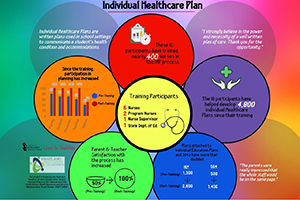Individual Healthcare Plans: Developing and Implementing Effective Schoolwide Practices (SD UCEDD)
May 11, 2017

|
Individual Healthcare Plans (IHP) are written plans used in the school setting to communicate students' health conditions and their care/accommodation needs. They are written for a variety of health conditions and make it easier for school teams to determine appropriate healthcare interventions. The Heartland Genetic Services Collaborative conducted a focus group in which many parents, school nurses, healthcare professionals, school administrators and advocates recognized that a consistent, standardized practice was not in place for healthcare plan development or implementation. This prompted Heartland to team with the University of South Dakota (USD) Center for Disabilities to design a project to improve the IHP process.
A team from the USD Center for Disabilities created a standard procedure and materials to serve as a "toolkit" of best practices for developing and utilizing IHPs. This team then trained school nurses and nurse supervisors on effective methods for creating and implementing IHPs in order to better meet students' individual needs. The participants in the training received hands-on practice using the "toolkit" in order to effectively use this model for schoolwide implementation. All training participants also took part in on-going follow-along support throughout the school year.
Ten participants from the eight-state Heartland region (Arkansas, Iowa, Kansas, Missouri, Nebraska, North Dakota, Oklahoma and South Dakota) were trained in the process in August, 2016; the participants included six school nurses, two program nurses, one nurse supervisor and one state Department of Education representative. All ten participants reported an increase in knowledge and understanding following the training, even those who rated themselves as having expert and advanced level knowledge prior to the training. Throughout the school year, those ten participants have trained nearly 400 additional school nurses in the IHP process. The participants have also helped develop over 4,800 Individual Healthcare Plans since the initial training. Following the training, the number of IHPs connected to Individual Educational Plans (IEP) or 504 plans have more than doubled in the schools served by one of the participants. Trained nurses have also noted that parents and school staff have demonstrated greater participation in the development of plans as well as increased satisfaction in the IHP process. See our infographic that highlights the project outcomes.
Based on the success of the first several months of implementation, the USD Center for Disabilities received a request for an additional training opportunity for school nurse representatives in one state in the Heartland region. This training was conducted in April 2017. Thirty-five additional school nurses, nurse supervisors and nursing directors were trained on the IHP process and "toolkit." Nine participating nurses stated that they would be training additional nurses in the IHP process; over 60 additional school nurses will be trained before the end of the 2017 school year. All training participants stated a "definite" or "substantial" increase in knowledge and skills related to the IHP schoolwide implementation process.
Due to the positive outcomes and feedback from training participants, the Center for Disabilities is pleased to offer training opportunities on the development and implementation of IHPs. Future research will focus on field testing the IHP model across schools and converting the toolkit to a web-based format. For more information, please contact Emily Meier, M.A. at [email protected] or Wendy Parent-Johnson, Ph.D. at [email protected].







